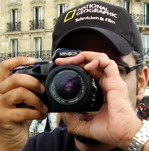I stand accused of keeping this blog only for the purpose of impressing my wife while she was away from Cairo. This charge is spurious. I categorically deny it. On with the show:
A few weeks ago, my friend Mr. Yosri Fouda invited Suf and me to dinner. Post meal, we went to the uber-posh Garden City Club for drinks, and ran into an animated conversation:
"But it's ours! Why should we not use it? Leih??" The woman's bejeweled fingers made a questioning gesture. Her fingers on the other hand flicked a cigarette.
 "Ya'ni I know that," said the man in the dark suit, shelling a pistachio. "But people will get confused."
"Ya'ni I know that," said the man in the dark suit, shelling a pistachio. "But people will get confused."The argument was about geem - Egyptians pronounce the "J" (the arabic letter "jeem") as a "G" ("geem"). So, Jamal becomes Gamal. Jezira (island) becomes Gezira.
Sometimes, the geem finds its way into english. The result can be comical. Take a look at the restaurant menu in the picture.
The woman was arguing with two TV journalists that Egyptian broadcasters ought to pronounce the geem on air, as they would normally, when talking to fellow Egyptians.
Egypt is the Hollywood of the Arab world. Egyptian movies, sitcoms, and news shows are watched by millions from Morocco to Muscat. Egyptian arabic, then, is the most well-known dialect. No matter where an Egyptian goes in this part of the world, everyone will understand him. He, on the other hand, will have no clue what they're saying.
Regardless, Egyptian broadcasters will switch to modern standard arabic, when they're on air, and a jeem will no longer become a geem.
The guys at Garden City Club thought that pronouncing the geem on television would alienate their pan-Arab audience.
"Bas, the geem is ours. We should be proud of it!" ranted the woman whose country receives the largest amount of US foreign aid after Israel.
"It's a question of Egyptian sovereignty!"

1 comment:
welcome back
Post a Comment